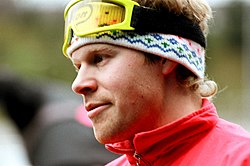Top Qs
Timeline
Chat
Perspective
Tomas Gustafson
Swedish speed skater From Wikipedia, the free encyclopedia
Remove ads
Sven Tomas Gustafson (born 28 December 1959) is a retired Swedish speed skater and distance skater, active in the 1980s, who won several events and set world records.
Remove ads
Early career
Born in Katrineholm, he won the World Junior Championships title in Grenoble, France, in 1979. A year later, at the European Championships for seniors, he finished 4th. The following month, he participated in the 1980 Winter Olympics at Lake Placid, New York, US achieving a 7th place finish in the 1500 m as his best performance. Later that same month, he defended his Junior World title.
1982 to Sarajevo leadup
In 1982, he became allround European Champion in Oslo, where he set a 10,000 m world record. As of 2017[update] this was the last outdoor world record for men on a lowland track.[citation needed] For this performance, he was awarded the Oscar Mathisen Award for the best skating performance of the season. A year later, on the same track, he won silver at the World Allround Championships, finishing second behind Rolf Falk-Larssen. Gustafson had the better allround point total (samalog), but Falk-Larssen was declared champion due to a rule stating that a skater winning three of the four distances and finishing the fourth was automatically pronounced the champion. This result caused a renewed debate about the three-distance-wins rule, which was subsequently abolished. From 1984 onwards, the champion was determined by the skater with most allround points.
Remove ads
Sarajevo to Calgary leadup
The following year, his focus shifted from the World Allround Championships to the 1984 Winter Olympics at Sarajevo. He won Olympic gold in the 5,000 m, finishing just two hundredths of a second ahead of Soviet skater Igor Malkov. In the 10,000 m he again faced a close finish with Malkov, this time losing by five hundredths of a second. Following these Olympics, Gustafson underwent knee surgery, contracted meningitis, and his father died.
Calgary
By the Olympic year 1988, he had regained his form. In January, he won the European Allround Championships in The Hague, the only speedskater to win at all four distances since the Second World War. His rival Malkov had retired, and Gustafson focused on outpacing long-distance skaters such as Dutchmen Leo Visser and Gerard Kemkers and Austrian skater Michael Hadschieff. Gustafson first succeeded in the 5000 m. He trailed Leo Visser's pace by eight hundredths of a second with only 400 m remaining but skated a strong final lap to win by one third of a second. Four days later, he won Olympic gold again, this time in the 10,000 m, setting a new world record time of 13:48.20, broken three years later by Johann Olav Koss. Gustafson received the Oscar Mathisen Award again for his 1988 performances. He also earned the Svenska Dagbladet Gold Medal and the Jerring Award.[1]
Remove ads
Late career
Gustafson's only notable achievement after the 1988 Winter Olympics in Calgary was a second-place finish behind Bart Veldkamp in the 1990 European Allround Championships. At the 1992 Winter Olympics in Albertville, he only took part in the 5000 m race, finishing 13th; this was Gustafson's last international race.
Personal life
Gustafson is married to curler Elisabet Gustafson.
Records
World records
Gustafson set two world records:
Source: SpeedSkatingStats.com[2]
Personal records
Gustafson holds an Adelskalender score of 157.701 points. In March 1988, he reached third place in the ranking, behind Eric Flaim and Michael Hadschieff. After improving his personal best time in the 1500 metres distance in December 1990, he reached second place. Gustafson was ranked among the top 3 for 1468 days.
Remove ads
References
External links
Wikiwand - on
Seamless Wikipedia browsing. On steroids.
Remove ads

